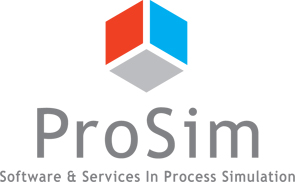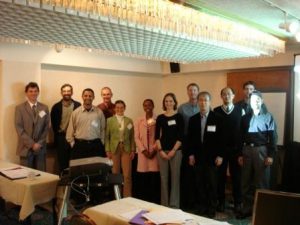
The course provided developers of process engineering code with the basics to implement CAPE-OPEN interfaces. Such a course had been requested by quite a few people in the past. Eleven people attended the course. They came from Louisiana State University, MetaHeuristics LLC, ENI (Italy), Idaho National Laboratory, Purdue University, ICES (Singapour), HTRI, SAIC, UOP, Praxair, Omega Simulation (Japan).
Usage of simulation and calculation software (commercial, academic or developed in-house) is now common in the process industries. The general evolution of this software leads toward the integration of detailed expertise in dedicated applications of relatively small size.
The requirement for improved interoperability and easier integration of these applications is increasingly important as the engineer wishes to be able to choose the most reliable and relevant elements according to the issues he/she is working on, and to assemble them to create a tailored process simulator.
CAPE-OPEN is the industry standard that defines rules and interfaces that allow applications or software components to interoperate.
The objective of this course was to introduce the main concepts of the CAPE-OPEN standard and to provide software developers with a first insight into how to implement it. The course addressed in particular the specifications common to software objects and domains, as well as the specifications required to access thermodynamic and unit operation calculations.
This course was particularly relevant for the people involved in software development who wish to make their existing codes comply with the CAPE-OPEN standard, in order to allow them to interact with other applications developed in-house, by universities, by third parties or commercially available.
Agenda:
Presentation of the goal, scope and history of CAPE-OPEN. A number of methods and tools used throughout the design of CAPE-OPEN standards are explained. The CO-LaN organization will also be briefly described.
CAPE-OPEN common specifications are reviewed in detail. CAPE-OPEN types and constants are listed and each CAPE-OPEN common concept (identification, parameters…) is explained.
The CAPE-OPEN thermodynamic interface specification is described. Practical elements (objects, packages, systems…) are provided to help attendees evaluate how to implement the specifications. Finally, available commercial and academic implementations are listed.
CAPE-OPEN Unit Operation specification is discussed and illustrated with scenarios and practical examples.
Different support tools used to help CAPE-OPEN implementation are reviewed, in particular the CAPE-OPEN Tester Suite, the CAPE-OPEN Wizards and CAPE-OPEN Logging and Testing Tool (COLTT).
Instructor:
Alain Vacher, IT Manager, ProSim SA.
Alain is in charge of software architecture and development and of maintaining ProSim’s software at the highest technological level. His competences in the information technology field and his sound understanding of chemical engineering software architecture make him a recognized expert in the European industry.

